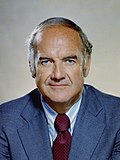This article needs additional citations for verification .(October 2022) |
| | |||||||||||||||||
| |||||||||||||||||
| |||||||||||||||||
| Elections in Iowa |
|---|
 |
The 1972 Iowa Democratic presidential caucuses were held on January 24, 1972, as the first step in determining the Democratic nominee for the 1972 election. [1] Maine Senator Edmund Muskie received the most committed votes with 35.5%, while South Dakota Senator George McGovern, who had been trailing in most polls, came in a surprise second with 22.6%. [2]


